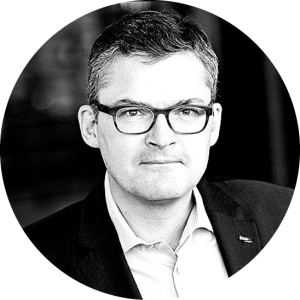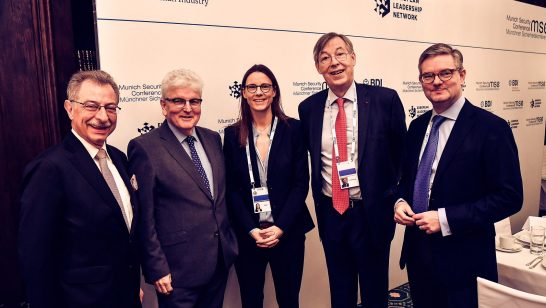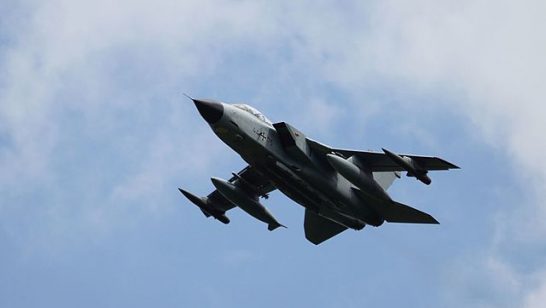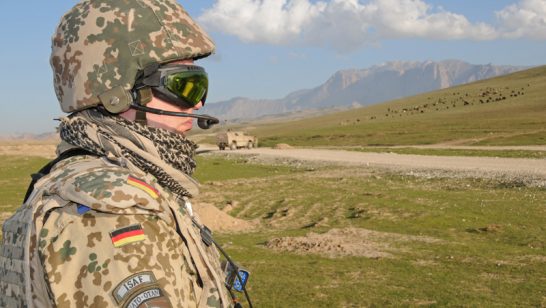
Among the many debates and conversations expected at the Munich Security Conference this week, the now much-anticipated release of Germany’s national security strategy is high on the list.
Writing in Foreign Policy this month, Chancellor Scholz outlined how Germany was “intent on becoming the guarantor of European security that our allies expect us to be, a bridge builder within the European Union and an advocate for multilateral solutions to global problems”, but to do so required a “new strategic culture” in Germany’s security strategy”, a Zeitenwende. Today, five members of the ELN Network to reflect on what to expect from the new strategy and where its main challenges lie.
________________________________________________________________________________________
“Germany needs to become a leader in defence and deterrence. It also has to think long-term about the future of the EU as an actor in defence policy, for which it seems ill-prepared. “

Dr Alexander Graef, Young Generations Leaders Network
Senior Researcher, Institute for Peace Research and Security Policy, Hamburg
When the new German national security strategy is published later this year, it is poised to disappoint many observers. Too little, too late, as they say. But strategic documents, particularly those, which stem from negotiations between numerous ministries under a three-party coalition, are hardly ever ground-breaking. They are the result of difficult compromises that have to integrate various political sensitivities. The important issue, then, is not the strategy per se but the societal processes its announcement is supposed to put in motion. Back in 2014, at the Munich Security Conference, German speakers, from the Foreign Minister to the President, agreed that the country would need to take upon more responsibility. This meant more engagement in out-of-area operations and in combating terrorism. In 2023, the challenges are quite different.
Germany needs to become a leader in defence and deterrence. It also has to think long-term about the future of the EU as an actor in defence policy, for which it seems ill-prepared. Ironically, the popular narrative of German strategic slumber is historically misleading. During the Cold War, German politicians, diplomats, military officers and civilian experts were among the top regarding defence and arms control debates. The German armed forces, both in East and West, were considered the best among allies. Overall, changing German strategic culture will require more than single phrases in government documents or better coordinative mechanisms for decision-making on the highest level. It is a task for the entire society.
________________________________________________________________________________________
“However, for this new strategic culture to be imagined, discussed, and institutionalised, it also needs greater commitment from Berlin. It requires ample financial means and material resources…”

Benjamin Brockt, Young Generations Leaders Network
Head of Protocol, Paris Peace Forum
A new strategic culture that places the sovereignty of Europe at the centre through a finally more engaged and proactive Germany in close collaboration with its partners will certainly initiate intellectual, legal, institutional, and material shifts in Berlin, Brussels, and beyond. Indeed, the first shift is an intellectual one.
Berlin failed to sufficiently embrace the requirement of a strategic culture in its foreign and security policy and now must abandon its once fundamental security policy certainties. I.e. Europe only being surrounded by “friends”, the US as a benevolent transatlantic hegemon, the self-perpetuating rule-based liberal order and the illusion that China and Russia would like to be integrated into it, and more, which have eroded considerably over the last two decades. It must discuss foreign and security policy comprehensively at various political levels and define strategic goals for Germany and Europe more thoroughly. There will also have to be legal and institutional shifts to establish a new strategic culture. One possible initiative could be to bring together the various ministries in some form of national security council.
However, for this new strategic culture to be imagined, discussed, and institutionalised, it also needs greater commitment from Berlin. It requires ample financial means and material resources to maintain highly qualified personnel, or state-of-the-art military equipment, to credibly project the sovereignty of Europe.
________________________________________________________________________________________
“A fundamental shift will not happen with an increase in defence investment in Germany, even if the amount of 100 billion would have been unthinkable only two years ago. Germany will first need to overcome the unwritten limits of its security policy after WWII…”

Jorge Domecq, Senior Network
Former Chief Executive of the European Defence Agency (independent capacity)
A fundamental shift will not happen with an increase in defence investment in Germany, even if the amount of 100 billion would have been unthinkable only two years ago. Germany will first need to overcome the unwritten limits of its security policy after WWII, which bank any approach that implies projecting power abroad. At this point, the Franco-German motor of the EU will function at its true potential, and the EU will be a truly geopolitical actor able to play its full role in a world where the economy is not the main factor of international competition.
Some argue that a crucial change required in the strategy is a clear decision not to condition the export of defence material to domestic politics where no particular security interest is involved. Indeed, that such a clear-cut position is required of all states in Europe. The criticism levied here is that If the position remains unclear, partners may express reserve in entering cooperative Defence projects in the future. Should this occur, given the industry’s reliance on exports, questions about the sustainability of the European defence model may be asked.
________________________________________________________________________________________
“What is missing is the will to translate the ‘Zeitenwende’ into a political programme. This will must come from the Chancellor’s Office, but it is so far lacking.”

Roderich Kiesewetter, Senior Network
CDU Member of the Bundestag and former General Staff Officer of the Bundeswehr
Europe is becoming more transatlantic, Eastern, dynamic and more ready to defend itself. Germany has so far failed to recognise this new geopolitical development, losing credibility in Central and Eastern Europe and the USA. What is missing is the will to translate the “Zeitenwende“ into a political programme. This will must come from the Chancellor’s Office, but it is so far lacking.
The Government is not united on key issues, such as our relationship with China or the prioritisation of defence and deterrence budgets compared to soft power budgets. There is also disagreement on how the strategy implementation will be evaluated and reviewed. We urgently need a National Security Council that is not bound by instructions. After all, we do not have a strategic culture in Germany. Instead, German security policy has been characterised by a lack of strategic foresight and strategic planning, a dysfunctional approach to complexity, and three German “life lies“.
First, we deemed ourselves “surrounded by friends and partners”, so we focused on social security, effectively demilitarising the Bundeswehr. Second, we built prosperity on a self-imposed dependency system: cheap energy from Russia, cheap value chains from China, and cheap security from the United States, without contributing to credible burden-sharing on our part. Third, we convinced ourselves of these dependencies’ righteousness through the narrative “Wandel durch Handel”.
Overcoming these will be the great challenge of the National Security Strategy. We are still far from being even a rudimentary guarantor of European security. First, trust must be regained, and the German hinge function between Eastern and Southern Europe must be filled. To achieve this, Chancellor Scholz himself must pursue a strategic culture.
________________________________________________________________________________________
“Zeitenwende is a question of military spending as much as military willpower to defend the European security architecture to which Germany is rhetorically so committed.”

Dr Henrik B. Larsen, Young Generation Leaders Network
Senior Researcher at the Centre for Security Studies, ETH Zürich
Chancellor Scholz rightly called for a change in German strategic culture in response to Russia’s imperialist conduct, but this does not seem to affect the willingness to deliver weapons to Ukraine. The fact that Scholz approved the transfer of Leopard battle tanks only after the pressure from allies rose to the level of embarrassment shows how far Germany remains from taking responsibility when security becomes a question of an actual combat situation. However, Germany must signal readiness to go to war if NATO’s deterrence is going to be credible with a greater European contribution in the coming decade as the United States focuses on China.
Zeitenwende is a question of military spending as much as military willpower to defend the European security architecture to which Germany is rhetorically so committed. Germany cannot really separate this issue from the armament of Ukraine, although half of the German public and most of the Social Democratic Party remain reluctant or believe that dialogue could somehow bring a favourable end to the war.
The opinions articulated above represent the views of the authors and do not necessarily reflect the position of the European Leadership Network or all of its members. The ELN’s aim is to encourage debates that will help develop Europe’s capacity to address the pressing foreign, defence, and security policy challenges of our time.







